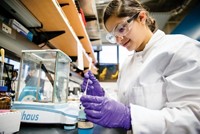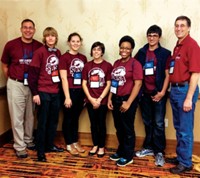Advertisement
Grab your lab coat. Let's get started
Welcome!
Welcome!
Create an account below to get 6 C&EN articles per month, receive newsletters and more - all free.
It seems this is your first time logging in online. Please enter the following information to continue.
As an ACS member you automatically get access to this site. All we need is few more details to create your reading experience.
Not you? Sign in with a different account.
Not you? Sign in with a different account.
ERROR 1
ERROR 1
ERROR 2
ERROR 2
ERROR 2
ERROR 2
ERROR 2
Password and Confirm password must match.
If you have an ACS member number, please enter it here so we can link this account to your membership. (optional)
ERROR 2
ACS values your privacy. By submitting your information, you are gaining access to C&EN and subscribing to our weekly newsletter. We use the information you provide to make your reading experience better, and we will never sell your data to third party members.
Careers
Project SEED From The Ground Up
Mentoring program has its roots in the political and social turmoil of the 1960s
by Linda Wang
February 18, 2008
| A version of this story appeared in
Volume 86, Issue 7

Troubled by the racial unrest of the 1960s, several members of the American Chemical Society, including Alan C. Nixon who would serve as ACS President in 1973, sought ways to improve the situation.
"We wanted to do our share to get people to become qualified to do jobs in the chemical industry," says Glenn Fuller, who was involved in some of the earliest discussions of Project SEED and is now a coordinator for the California Section. The acronym derives from the project's roots in what was an ACS group then known as the Subcommittee on the Education & Employment of the Disadvantaged.
On April 2, 1968, the ACS Council adopted a resolution calling on the society to "take the appropriate steps to ease the problems of underprivileged segments of the nation's population, particularly in relation to lack of education and unemployment."
The original Project SEED program was broader in scope than it is today. It included journal donations to colleges serving disadvantaged students, a tutoring program, a career guidance booklet, summer job placement for college students, and a summer program to provide research opportunities to disadvantaged high school students.
The summer research program, then called Project Catalyst, was selected as Project SEED's pilot program, and in the summer of 1968, Milton Harris, then-chair of the ACS Board of Directors, donated $5,000 for 10 students to participate.
During its infancy, Project SEED struggled to prove itself. In a letter to the Project SEED task force, Nixon wrote: "One criticism of SEED that I have encountered in various parts of the country is: 'Why should we be trying to get more people into chemistry when we have so many unemployed chemists?' The answer is, of course, that SEED is not a program to turn the disadvantaged into chemists. It is a program of social action which is intended to help some of the disadvantaged get out of the mire and shake off some of the restraints placed upon them by the accidents of race, place, or poverty. In doing this, we will not only be helping them but also ourselves."
In 1973, ACS evaluated the program and decided to concentrate its limited resources on Project Catalyst, and the other parts of the program were discontinued. Project Catalyst then took on the name Project SEED.
In 1992, Alfred and Isabel Bader provided funding to expand the program and offer students a second summer of research. "You learn so much more in the second year than in the first year," says Alfred Bader.
Students receive a stipend of $2,500 for the first summer and $3,000 if they continue for a second summer. Project SEED also offers alumni a limited number of nonrenewable scholarships for their freshman year of college. Scholarship winners receive up to $5,000 toward tuition and books. Since 1993, the program has awarded 344 scholarships.
Funding for Project SEED comes from a combination of sources, including individuals, corporate and foundation donors, and a Project SEED endowment managed by ACS.
"It's a really wonderful feeling to know that you've helped somebody," says Isabel Bader. She and her husband Alfred continue to donate $100,000 a year to the program.
For Alfred Bader, the desire to help others hits very close to home. "I think we should help the neediest students. I had nothing when I came to North America. I was a prisoner of war," he says. "And then I got scholarships and fellowships, and I was treated so well by my university. I was helped so much when I was a youngster. We try to give back."
ACS members can donate to the program in a variety of ways, including checking a box on their membership renewal form. For more information on Project SEED, e-mail projectseed@acs.org or call (800) 227-5558, ext. 4380. To make a donation to the program, visit www.acs.org/giving.
- » Harvesting Project SEED
- C&EN catches up with past participants in ACS’s 40-year-old mentoring program
- » Project SEED From The Ground Up
- Mentoring program has its roots in the political and social turmoil of the 1960s
- » Committee On Project SEED
- Long-term goals include expanding the program and better tracking of former participants
- » 2007–08 Project SEED College Scholarships
- The ACS Committee on Project SEED has announced the winners of its 2007–08 college scholarships.
- » Photo Gallery: Past SEED Participants




Join the conversation
Contact the reporter
Submit a Letter to the Editor for publication
Engage with us on Twitter